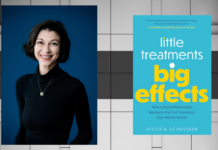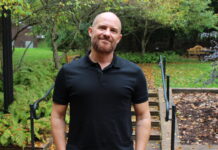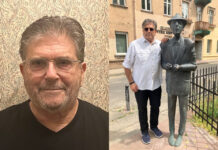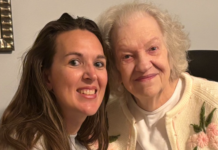Conveying Hope, Empowering Teens: An Interview With Jessica Schleider
Clinical psychologist Jessica Schleider is founding director of the Lab for Scalable Mental Health, researching single-session interventions.
The TikTokification of Mental Health on Campus
Many people view their social media feeds as reflections of their identities—and when posts center on a specific diagnosis, it can feel like the platform is diagnosing them.
Madness, Utopia and Revolt: An Interview With Sasha Warren
Sasha Warren founded Of Unsound Mind to trace the histories of psychiatry and its connection to policing and prisons.
“War Cry For Change”: Veterans Launch Campaign for Informed Consent and Safe Deprescribing at...
Derek Blumke and Timothy Jensen: The Grunt Style Foundation leads a new phase in the movement to combat psychiatric drug harm.
“Confidential” 988 Conversation Records Shared with Corporations
Recordings of 988 callers’ voice, text, and chat conversations are being shared with researchers, AI developers, and corporations without consent.
Dramatic Rise in Police Interventions on 988 Callers
New data reveals that four times as many callers to 988 as previously publicly claimed are getting visited by police or emergency medical services.
Demedicalizing Depression: An Interview with Milutin Kostić
Justin Karter interviews Milutin Kostić on the fundamental flaws in depression research and its neglect of human complexity.
Leaving Biological Psychiatry Behind: An Interview With Rodrigo Nardi
Rodrigo Nardi is a psychiatrist and psychologist. He obtained his psychology degree in the year 2000, and following that, he obtained a certificate in...
Maryland Enacts a “Draconian” Assisted Outpatient Treatment Program
Advocates vow to keep resisting psychiatric force, fighting for rights-based supports
Context and Care vs. Isolate and Control: An Interview on the Dilemmas of Global...
MIA’s Ayurdhi Dhar explores with Arthur Kleinman how healthcare systems often overlook personal stories, focusing on treating diseases rather than individuals. Discover why this renowned Harvard psychiatrist and medical anthropologist believes in restoring humanity to medicine.
Giving Caregivers a Platform: Meagan, Mother of Matt
A mom describes her son's descent into the harms of psychiatry—and his way out. "It was really difficult to watch Matt decline. He had given up hope that he could get well."
Undisclosed Financial Conflicts of Interest in the DSM-5: An Interview with Lisa Cosgrove and...
On the Mad in America podcast we talk with Lisa Cosgrove and Brian Piper about their BMJ paper entitled "Undisclosed Financial Conflicts of Interest in the DSM-5 TR: Cross-Sectional Analysis"
Deprescribing Psychiatric Drugs to Reduce Harms and Empower Patients: Interview with Psychiatrist Swapnil Gupta
Ayurdhi Dhar interviews psychiatrist Swapnil Gupta on psychiatric drug discontinuation, drug cocktail risks, patient choice, and the need for trust and transparency.
Is Madness an Evolved Signal? Justin Garson on Strategy Versus Dysfunction
Philosopher Justin Garson discusses the potential benefit of looking at madness not as disease or defect, but as a designed feature.
Depression: Psychiatry’s Discredited Theories and Drugs Versus a Sane Model and Approach
Psychiatry’s depression outcomes are poor because its bio-chemical-electrical treatments are based on a depression model that science has flushed down the toilet.
“A Dangerous Substance”: The Impact of Social Media on Youth Mental Health
This is what social media does, she says. It draws people in. It hurts people. In the worst cases, it kills people.
Searching for the “Psychiatric Yeti”: Schizophrenia Is Not Genetic
After decades of study, billions of dollars spent, and thousands of studies conducted, the failure to identify any genes for schizophrenia should definitively put to rest the notion that schizophrenia is a genetic disorder, according to E. Fuller Torrey.
The Psychological Humanities Manifesto: An Interview with Mark Freeman
Justin Karter interviews narrative and philosophical psychologist Mark Freeman about his vision for the future of psychology.
Therapy by App: A Clinical Psychologist Tries BetterHelp
Revealing concerns about BetterHelp’s ability to provide quality, secure treatment—and the unresolved tensions in the science of psychotherapy that services like BetterHelp exploit.
Winding Back the Clock: What If the STAR*D Investigators Had Told the Truth?
The STAR*D Study has been cited as real-world evidence of the efficacy of antidepressants. In truth, it told of a failed paradigm of care.
Robert Whitaker Answers Reader Questions on Pharma Marketing and Psychiatric Drugs
In Part 2 of our reader Q&A podcast, MIA founder Robert Whitaker answers questions on pharmaceutical marketing and issues with psychiatric treatments including psychiatric drugs and electroconvulsive therapy.
Robert Whitaker Answers Reader Questions on Mad in America, the Biopsychosocial Model, and Psychiatric...
On the Mad in America podcast this week we have Robert Whitaker with us to answer questions sent in by readers and listeners.
After MIA Calls for Retraction of STAR*D Article, Study Authors Double Down on the...
In their letter to the editor, Rush et al. have doubled-down on the fraud they committed in their 2006 summary report of STAR*D outcomes.
The Making of a ‘Madness’ That Hides Our Monsters: An Interview with Audrey Clare...
In this interview, Audrey Clare Farley reveals how our understanding of schizophrenia was built to avoid acknowledging sexual trauma, religious abuse, and racism.
The WHO and the United Nations: Let Freedom Ring for the Mad
This is a call that challenges how psychiatry is practiced today and ultimately challenges its power in society.

































